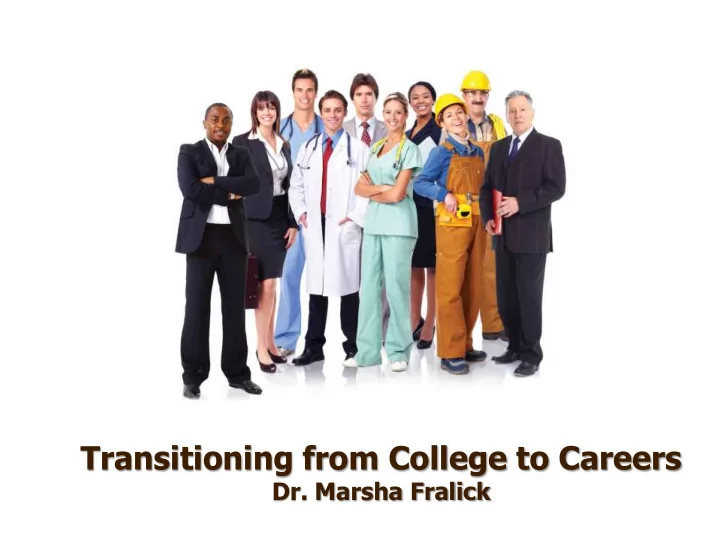

Transitioning from College to Careers Dr. Marsha Fralick
Ice Breaker Find a partner Introduce yourself Where do you work? What career did you get? Does it match your personality type, interests or values?
Overview The problem The research Critical elements of career development Some practical tools What students can do A call to action
Resources and References Handout www.collegesuccess1.com Click on Conferences marsha@marshafralick.com PowerPoint Research Articles Assessments Career Resources
The most important reason students go to college is to find a satisfying career. “I am in the New Millennial generation. We want to go to school to get an education and have a nice career at the end .”
The Problem Students are graduating and having a difficult time finding a career. Some lose motivation because they have not chosen a major and drop out of college.
Student loan debt averages $31,000 for a BA. 9 percent of recent grads are unemployed.
The Solution What can faculty do? What can students do?
The Research: Benefits of Career Development Folsom and Reardon examined research on college career development from 1920-2003 based on 17,600 students.
Obvious Benefits • Increases knowledge of career information • Helps students choose a major and career • Helps students with decision-making Students like taking career courses.
Career Development Increases: • Intrinsic motivation • Internal locus of control • Self-knowledge • Cognitive development • Retention • Graduation rates!
Graduation Rates • 4 Year colleges On average, only 40% graduate in 6 years • Community colleges On average, only 20% graduate in 3 years
College Success: A Study of Positive and Negative Attrition • The successful student had a definite goal or college major. • Based on this research, a career development component was added to our college success course.
Noteworthy Results • 87% of students had chosen a major by the end of the course • 62% of students reported more confidence in their academic skills • 88% of students rated the course as good or very good
Critical Elements of Career Development • Career assessments with individual interpretation and feedback • Current and reliable career info • Written exercises to engage students
Some Practical Tools
Personality Assessment • Valid • Reliable • Based on college scenarios that are easy to read and understand • Personality types (I-E, S-N, T-F, J-P)
Critical Element: Current and Reliable Career Information
Career Information Both the personality and multiple intelligences assessments connect to the O*Net database of careers
Follow the directions on the handout to take the Do What You Are personality assessment
Multiple Intelligences • Based on Howard Gardner’s theory of multiple intelligences • Definition: The human ability to solve problems or design or compose something valued in at least one culture • Helps students think positively about their talents • Connects multiple intelligences to careers
Sample Profile
Critical Element: Written Exercises to Engage Students
Journal Entries
Student Portfolio Sample Student
Students add careers to their online portfolio
Personal Feedback
What can students do to improve their career prospects after college? Think Pair Share 2 minutes
The Research Rutgers University • 40% of students reported that they should have been more careful about choosing a major. • They would have done more to prepare for careers – Internships – Part time work – More courses to prepare for a career
My blog has current issues and teaching tips. www.collegesuccess-fralick.blogspot.com
What can students do to prepare for careers after graduation? Think Pair Share 2 minutes
What Students Can Do • Use Career Services • Volunteer • Internships • Part time work • Informational interviewing • Use online tools – LinkedIn – Facebook • Establish personal brand online
• Incorporates knowledge of self and how personal strengths can be used in the workplace • Manage online presence
Manage Online Presence • Photos or references to drug or alcohol use or abuse • Discriminatory comments on race, religion or gender • Negative comments about previous employers • Poor communication skills
Set up a nameplate website About.me Take control of your online presence. Include: Resume Samples of work Website
Goal -An aim or desired result
A Job, A Career or a Calling? By Martin Seligman author of Character Strengths and Virtues
A Job What you do for a paycheck
A Career Has deeper personal meaning Involves achievement, prestige and power
A Calling A passionate commitment to a job for it’s own sake A complete absorption in an activity whose challenges match perfectly with your abilities.
Comments or Questions?
Recommend
More recommend